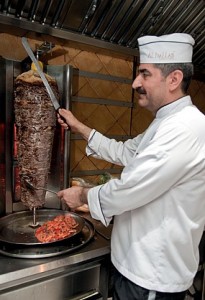New food safety rules for Dubai shawarma shops are expected soon and will cover the way eggs are used in mayonnaise for shawarmas as well as the space, layout, cooking, and storage standards for the outlet, among other points.
 Their comments came on the sidelines of the announcement of a campaign to train and educate some 4,000 food handlers in Dubai on food safety.
Their comments came on the sidelines of the announcement of a campaign to train and educate some 4,000 food handlers in Dubai on food safety.
The campaign, run by the municipality and Unilever Food Solutions, was announced on April 7, World Health Day, which this year focused on food safety.
The shawarma rules could be implemented or announced by the end of April but it is understood outlets will be given a grace period to fully comply.
Shawarma, an Arabic meal made from shreds of grilled chicken or meat pieces rolled in pita bread, is one of the most common snacks enjoyed by Emiratis and expats.
The meat is piled up in boneless slices in a cylinder shape around a large central skewer rotated over a vertical grill.
Shawarma stands, attached to restaurants, are abundant in the UAE. They used to be found in the open air before officials directed they be moved indoors or confined in an enclosure.
On Tuesday, municipality officials said there was already an exhaustive Food Code available for all food outlets to help them comply with the hundreds of existing food safety rules to a greater degree.
Bobby Krishna, the department’s principal food inspection officer, said inspectors “occasionally find salmonella” contamination in shawarma shops and that some shawarma makers use raw eggs — susceptible to salmonella — instead of pasteurised eggs to make their own mayonnaise, which will not be allowed (Australia, are you listening?)
“If one person has an infected egg, one person falls sick. If you use that egg in mayonnaise — which will go into many shawarmas — many people will fall sick,” he added.
Chicken, the most popular meat used in shawarma, is another food source more commonly associated with salmonella infections than other foodstuffs.
“We are going very risk-specific. You don’t wait for food poisoning to occur. Shawarma by its nature is risk-prone. We occasional find salmonella; we found some unfit samples.”
He stressed however “we are not saying ‘don’t eat shawarma’.”
